Invisalign – Dallas, TX
The Easiest Way to Get Straighter Teeth
Do you want straighter teeth, but hate the idea of having metal braces? You’re certainly not alone! Unfortunately, leaving crooked teeth and bite issues untreated can lead to serious complications for your mouth, jaws, and confidence over time. Thankfully, at Avion Dental & Orthodontics, we’re proud to offer Invisalign in Dallas, the easiest way to get straighter teeth! These practically invisible aligners are removable and comfortable, making them the perfect choice if you want to fix your orthodontic issues without wires and brackets! Read on to learn more, and give us a call today to schedule your consultation.
Why Choose Avion Dental & Orthodontics For Invisalign?
- #1 Insurance, Medicaid, CHIP, & Financing Accepted
- #2 Evening & Weekend Appointments Available
- #3 Board-Certified Orthodontist on Staff
How Invisalign Works
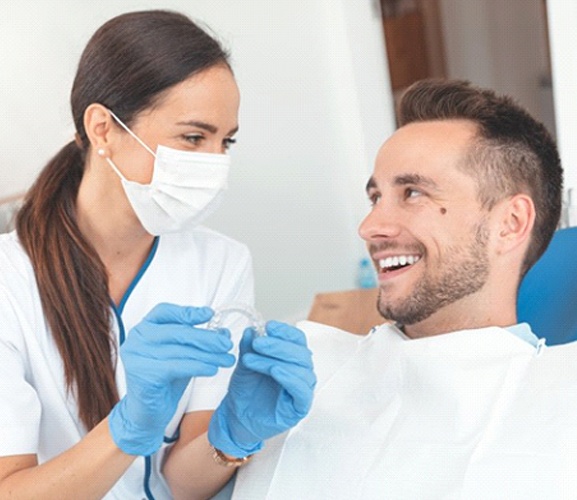
Invisalign aligners are clear plastic trays that you wear over your teeth, where they place gentle pressure on specific points to slowly push them into their ideal positions. It will take about two weeks of wearing your aligners for 20-22 hours a day for your teeth to adjust, and then you’ll switch to the next set of aligners to continue moving them. You’ll go through a series of aligners over the course of your treatment, with each set of aligners taking you one step closer to a perfectly straightened smile. Every 6-8 weeks you’ll come visit us for a quick checkup and before you know it, you’ll have a beautifully straightened smile!
Who Can Invisalign Help?
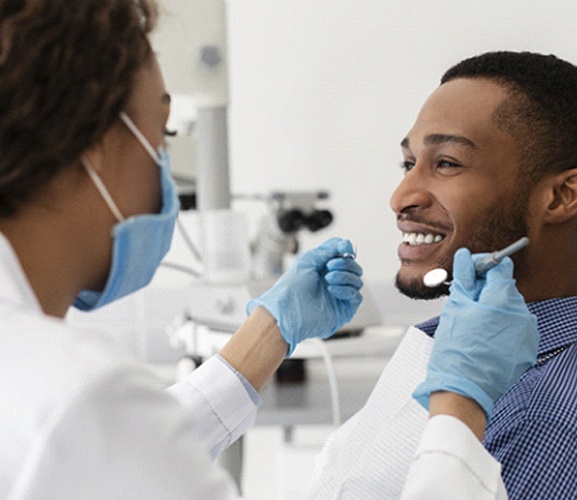
Thanks to our state-of-the-art technology, Invisalign is now more powerful and effective than ever before! While severe cases of misalignment are still best treated with metal braces, Invisalign is an excellent solution for mild to moderate levels of the following orthodontic problems:
Crowded Teeth
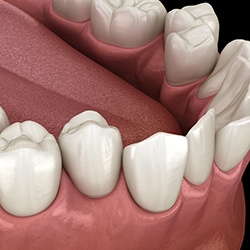
Crooked, overlapping teeth create small spaces that trap plaque and bacteria, which dramatically increases your risk of cavities and gum disease. So, if you are struggling with overcrowding, we recommend scheduling a consultation with us, even if you are happy with the appearance of your smile. If we determine that you’re a good candidate for Invisalign, then we can use a custom series of trays to realign your teeth, giving them the space they need to remain healthy in the process.
Gaps Between Teeth
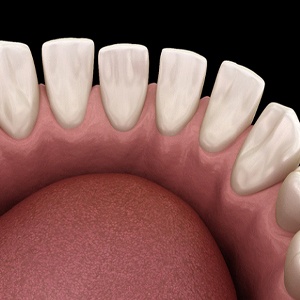
If there are spaces or gaps between your teeth, they’re at a higher risk of damage. That’s because, over time, they’ll become worn down and more prone to chipping and cracking. Gently closing these spaces with Invisalign will go a long way in keeping your teeth strong and healthy. Plus, since the aligners are basically invisible and completely removable, you can smile confidently and eat all of your favorite foods throughout your orthodontic treatment!
Overbite
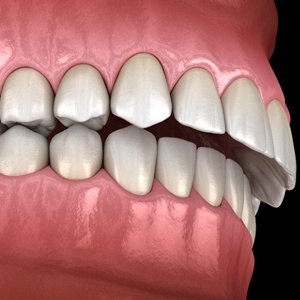
Do your upper teeth protrude beyond your lower ones considerably? If so, you might be wondering if Invisalign can fix overbites, or if traditional braces are your only option. We have good news: clear aligners have proven to be an effective solution for patients with mild to moderate cases. So, don’t wait – schedule a consultation with us to see if you’re a candidate for this discreet orthodontic treatment!
Underbite
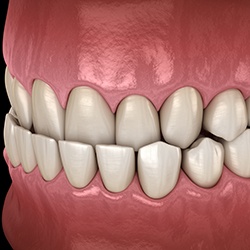
Underbites are another common bite problem that can take a toll on everything from your self-esteem and your oral health to your speaking patterns. For all of these reasons, we recommend exploring your treatment options. If we determine that Invisalign is one of them, then we can move your teeth and bite into proper alignment with clear aligners and any other orthodontic accessories that are needed, like rubber bands and buttons.
Crossbite
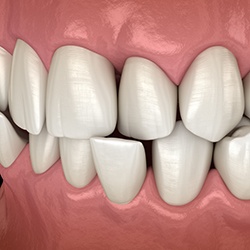
Usually, crossbites aren’t as talked about as the other bite problems on this list. However, that doesn’t make them any less serious. In fact, even mild cases can lead to considerable jaw pain and TMJ dysfunction. So, if you haven’t already, schedule an appointment at our Dallas dental office so we can determine if you’re a good candidate for Invisalign.
Open Bite
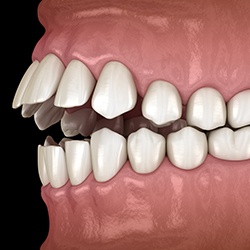
An open bite is when the upper and lower teeth don’t meet when a patient bites down. While that may not seem like an issue, it can lead to premature wear and, as a result, an increased risk of dental damage. So, if you think you may be struggling with this orthodontic problem, don’t hesitate to schedule an Invisalign consultation with us so we can determine if clear aligners are right for you!
Benefits of Invisalign
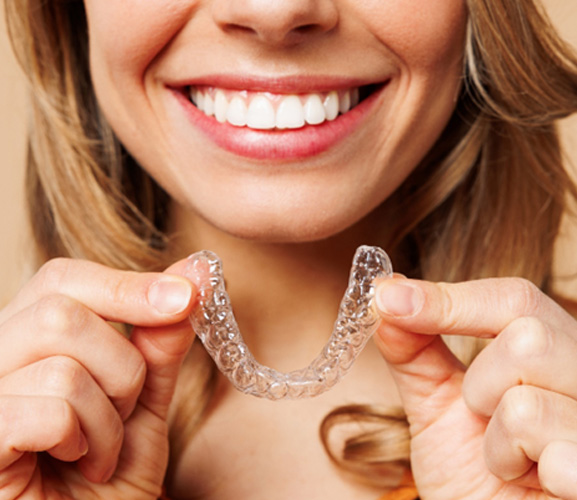
Invisalign continues to gain popularity as a clear alternative to traditional orthodontics, and it’s easy to see why! This method of straightening your smile comes with many unique advantages that appeal to patients of all ages.
Continue reading to learn more about the many advantages of choosing this treatment, and please don’t hesitate to contact us if you have additional questions.
Discreet Aligners
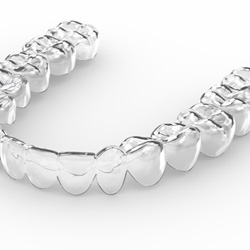
One of the main reasons that so many adults and teens alike choose this alternative orthodontic method is that it’s much less noticeable than standard braces. Instead of relying on metallic materials, this option utilizes transparent trays that fit snugly over your arches to gently shift your pearly whites to their ideal places without attracting as much unwanted attention.
Better Dental Hygiene
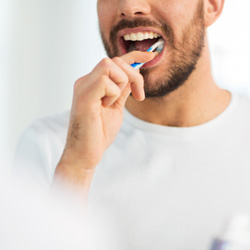
Braces are also notoriously difficult to clean because it’s hard to navigate a toothbrush and floss around the brackets and wires. Unfortunately, this can increase the likelihood of developing cavities, gum disease, or stained enamel.
Meanwhile, Invisalign is removable, so you can brush and floss your teeth thoroughly twice daily as usual. You should also gently scrub your trays with a soft-bristled brush and clear dish soap that won’t abrade the material. This helps prevent oral issues so that your smile is as healthy as it is beautiful when you finish treatment.
Enhanced Comfort
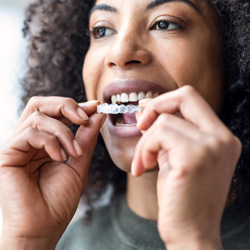
Anything that places enough pressure on your teeth to shift them can potentially cause pain, including Invisalign. Some patients develop aches when they first start wearing their trays and then again when they switch to the next set in their series because it can take some time for their teeth to adjust to the altered dimensions.
However, the plastic material of these aligners is typically considered much more comfortable than the sharp corners and ends of metal brackets and wires. Braces are notorious for cutting the insides of your gums, cheeks, and lips, which can fortunately be avoided with these clear trays.
Faster Follow-Ups
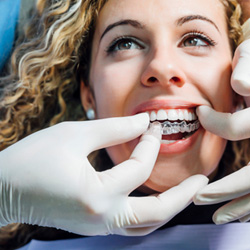
About every six to eight weeks, you’ll need to visit our office in Dallas for a routine follow-up appointment. This allows our providers to monitor your condition, track your treatment progress, and make any adjustments as needed. They’ll also provide the next aligners you’ll be required to wear.
Thankfully, these visits are much shorter than follow-ups for traditional orthodontics, and might only last about 15 to 30 minutes!
Improved Confidence
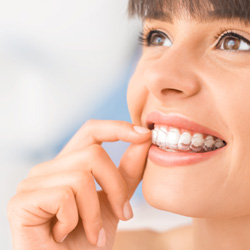
One of the first things people notice about you is the quality of your smile, and if your teeth have bulky metal braces cemented to them, you might feel anxious about being judged for your appearance.
Meanwhile, the completely transparent plastic trays of Invisalign allow your natural smile to shine through so that you look and feel like the best version of yourself while wearing them.
Non-Invasive Option
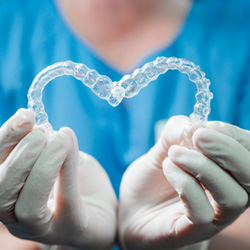
Invisalign is also considered less invasive than traditional braces because it doesn’t interfere as much with your daily routines and habits. For instance, there are no dietary restrictions to adhere to because the trays are removable and shouldn’t be inserted for meals.
Furthermore, you’re better able to maintain your regular hygiene routine without changes, making this service a much more feasible option for many patients.
Living with Invisalign Aligners

Are you interested in learning what your day-to-day life will look like once you begin your orthodontic treatment with clear aligners? If so, this next section is for you! In it, you’ll find helpful information on everything from how to meet the 20-hour-a-day minimum to how to prevent stubborn stains from surfacing.
Wearing Your Trays

Wearing your aligners for a minimum of 20 hours a day is crucial when it comes to staying on track with your treatment plan. Although this might seem like an easy goal, your aligner-free time goes by quickly if you aren’t intentional. That’s why we recommend only taking them out when it’s absolutely necessary. It’s also helpful to use the stopwatch on your phone as a guide!
Cleaning Your Aligners
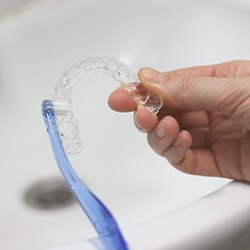
When you take your aligners out of the packaging, they will be perfectly clear. If you don’t take good care of them, however, they will slowly develop a yellow hue. That’s why it’s so important to rinse them with clean, cool water each time you take them off. You should also use a damp soft-bristled toothbrush and clear, mild dishwashing liquid to remove plaque and other debris from the surface twice a day.
Eating & Drinking

When it comes to eating and drinking, there’s really only one rule: you need to remove your aligners beforehand (with the exception of water). This is important because, if you don’t, the plastic will warp or break, rendering them virtually useless.
Important reminder: Although there aren’t any dietary restrictions with Invisalign, you should eat mostly healthy, well-balanced meals to prevent cavities and other common oral health problems.
Losing or Damaging a Tray

One aspect of living with Invisalign that patients often overlook is the unexpected. For example, what should you do if you accidentally drop your aligners, causing them to break? What if you look down and your trays aren’t where you thought they were? The best thing to do in both of these situations is to call our Dallas dental office so we can determine how to get you back on track (ideally with little to no delays).
Scheduling Progress Visits

Unlike other orthodontic treatments, which require monthly adjustment appointments, Invisalign progress visits are usually every 6-8 weeks. Plus, if your teeth are moving as anticipated, there’s a good chance that you’ll be in and out of our office in 30 minutes or less. That’s why busy students, parents, and professionals love clear aligners: they are convenient!
Understanding the Cost of Invisalign
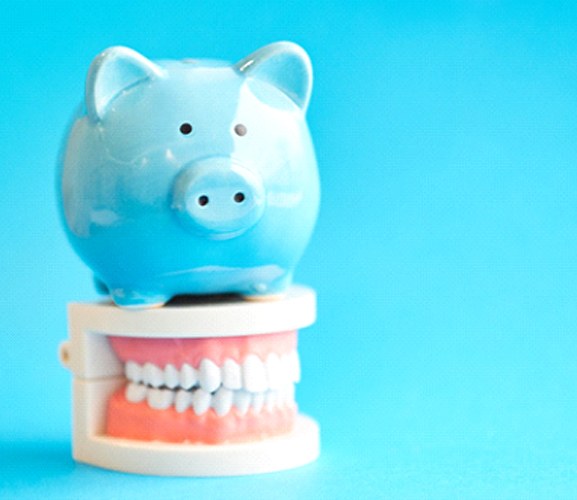
Until you come in for an evaluation, we can’t give you an accurate estimate of how much your cost of Invisalign in Dallas will be. This is because every treatment is customized to meet the unique goals and needs of each patient. During your consultation, we’ll consider numerous factors – such as your age, oral health, and the complexity of your case – to determine how long and how much your treatment will be. We can also help you find out if your insurance covers Invisalign. Alternatively, we offer non-insurance financing options. Whatever your budget is, we can help you discover just how affordable your new smile with Invisalign can be!
Factors That Affect the Cost of Invisalign
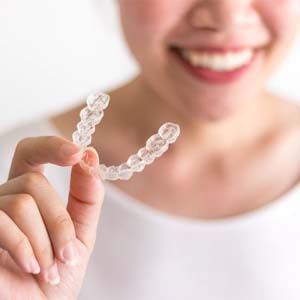
When you meet with your Invisalign dentist in Dallas for an initial consultation, we’ll go over the variables that impact your treatment costs. To do so, we’ll consider questions like:
- How severely misaligned are your teeth? – The more movements your teeth need to make, the more aligners you’ll require. Therefore, your treatment will naturally cost more.
- Are you straightening one arch or two? – Some patients may only need to wear aligners on their upper or lower arch, meaning that fewer aligners are necessary.
- Will you comply with treatment? – If you don’t wear the trays as often as you should, your teeth won’t shift as quickly. Your treatment will then take longer, resulting in the need for more aligners.
- Do you need additional accessories? – You may require special attachments on your teeth or elastics for your trays in order to align your teeth, which can increase your total costs.
Invisalign vs. DIY Clear Aligners: Which Costs More?
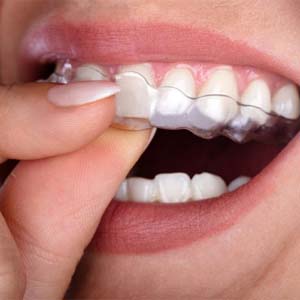
Nowadays, you can order clear aligner systems online and handle the entire teeth-straightening process at home. These treatments rarely cost more than $2,000, while Invisalign tends to cost somewhere between $3,000 and $8,000. The lower price of “do-it-yourself” clear aligners may seem attractive at first, but is it worth it?
Here are a few things to keep in mind about DIY clear aligners vs. Invisalign:
- DIY aligners are typically made from cheap plastic, while Invisalign uses an advanced, patented system designed for maximum comfort and highly effective tooth movement.
- Many people who have used DIY aligners have found them to not deliver the results they wanted. In fact, DIY aligners may even cause your misalignment to worsen, resulting in the need to get them treated by a professional anyway. Invisalign, on the other hand, is consistently successful.
- Throughout Invisalign treatment, you’ll be supervised by an experienced team who genuinely cares about you and is there for you every step of the way. With DIY clear aligners, you’re probably only viewed as another name on their list of customers.
Does Dental Insurance Cover Invisalign?
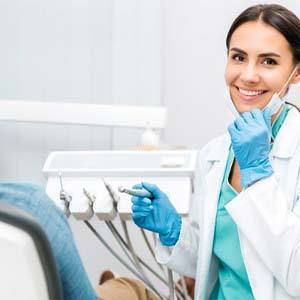
While some dental insurance policies cover Invisalign, it’s not necessarily a given. For example, some may view it as a cosmetic service and not cover it at all, while others may only cover a portion of it for patients under the age of 18. Whatever the case may be, our team at Avion Dental & Orthodontics can help you navigate the details of your plan. We’re in-network with many of the most prevalent insurance providers. We also welcome Medicaid and CHIP to make the cost of your child’s Invisalign treatment more manageable.
Options for Making Invisalign Affordable

Besides dental insurance, we have other ways of making Invisalign in Dallas affordable. Countless patients have been able to split up their treatment costs into budget-friendly chunks thanks to CareCredit and our in-house financing options. We have a variety of payment plans to choose from, many of which are flexible and come at low interest rates!
Invisalign FAQs
Will It Hurt to Wear Invisalign Aligners?
Most people find Invisalign to be more comfortable than metal braces. The Invisalign aligners are made out of a smooth plastic that won’t irritate the gums, which means you can avoid some of the common inconveniences that come with brackets and wires. Of course, you’ll still feel a little bit of soreness when you first start wearing your aligners; after all, the orthodontic appliance needs to exert constant pressure on your teeth in order to move them. However, you’ll typically adjust to your aligners in a short amount of time, at which point the discomfort should fade. You can use ice packs and over the counter pain relievers to help manage your discomfort in the meantime.
What Can I Eat with Invisalign?
Braces are known to significantly limit your diet, as anything overly hard or sticky might damage the brackets and wires. But with Invisalign, there’s no need to avoid certain foods at all because you won’t even be wearing your aligners when it’s time to eat. You’ll simply take them out of your mouth and place them in their container, then enjoy your meal or snack. Once you’re finished, you can give your teeth a quick brush to remove any lingering food particles before putting the aligner back in your mouth. Be sure not to leave your aligners behind or throw them out by mistake!
Can I Get Invisalign Even If I’ve Had Braces Before?
Sometimes the teeth become misaligned again even after you’ve completed a traditional orthodontic treatment. This is often a consequence of not wearing a retainer. Depending on the changes needed, Invisalign may be a good option for re-straightening your teeth. Every orthodontic case is unique, so we’ll need to examine your teeth, bite, and jaw first to determine what changes need to be made and whether Invisalign is the best option.
Will Wearing Invisalign Change the Way I Talk?
Invisalign aligners will cover key areas of your mouth, and they’ll change the way your tongue moves against your teeth. As such, you might notice a slight lisp at the beginning of your treatment, but luckily this is a short-term problem; once your tongue gets used to the presence of your aligners, you should return to a normal speaking pattern. It usually takes a few weeks for an Invisalign lisp to fade, but you can speed things along by getting some practice in. Try reading aloud whenever you can, and repeat words such as “sixty” and “Mississippi” so that you can get used to pronouncing them.
